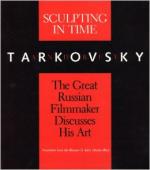
|
| Name: _________________________ | Period: ___________________ |
This quiz consists of 5 multiple choice and 5 short answer questions through Chapter II.
Multiple Choice Questions
1. What novelist wrote The Possessed?
(a) Fyodor Dostoevsky.
(b) Anton Chekhov.
(c) Alexander Marsh.
(d) Leo Tolstoy.
2. For how long did Tarkovsky work on his first feature film?
(a) 6 years.
(b) 8 months.
(c) 1 year.
(d) 2 years.
3. Where did Tarkovsky study film-making?
(a) Ukrainian Institute of Cinematography.
(b) Paris Institute of Cinema Studies.
(c) State Institute of Cinematography.
(d) Moscow Institute of Film Studies.
4. When was Tarkovsky born?
(a) 1951.
(b) 1932.
(c) 1945.
(d) 1940.
5. In what year was Tarkovsky's film Mirror released?
(a) 1982.
(b) 1975.
(c) 1968
(d) 1967.
Short Answer Questions
1. What word refers to the falling action of a narrative in film?
2. Of what artist does Tarkovsky write when, "he was dying of hunger went off into the mountains with a home-made bow and arrow to shoot some sort of game" in Chapter I?
3. What word means a figure in which the name of one thing is used in place of another that is suggested by or associated with it (e.g. the Kremlin for "the Russian government")?
4. A member of what institute sent Tarkovsky a notice published in their wall newspaper stating that the appearance of Tarkovsky's film, Mirror, aroused wide interest in his institute as it did all over Moscow?
5. What Italian painter of the Venetian school and contemporary of Raphael does Tarkovsky discuss in Chapter II?
|
This section contains 235 words (approx. 1 page at 300 words per page) |

|




